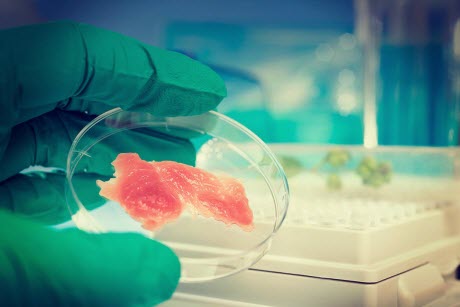New Technologies Ready to Make Their Mark on Foods of the Future
Sometimes you don’t need a crystal ball to predict the future—it’s right in front of you. That’s why FutureFood 2050 turned to top food technology innovators to find out more about the latest projects with the potential to revolutionize different areas of our food system.
 Israeli biomedical engineer Amit Gefen says his plans for a lab-grown chicken breast are just the beginning of a new era in sustainable meat.Photo courtesy of the Institute of Food TechnologistsThe newest series of interviews from the Institute of Food Technologists (IFT) FutureFood 2050 publishing initiative, which explores how increasingly sophisticated science and technology will help feed the world’s projected 9 billion-plus people in 2050, showcases the ingenuity of researchers working on a wide array of solutions designed to improve food sustainability, nutrition, agriculture and safety. None of these technological initiatives is yet in widespread use, but all have the capability to help effect major changes in the way our food is produced. And all of the technologies’ proponents are eager to see their work expand to improve the food system on a larger scale.
Israeli biomedical engineer Amit Gefen says his plans for a lab-grown chicken breast are just the beginning of a new era in sustainable meat.Photo courtesy of the Institute of Food TechnologistsThe newest series of interviews from the Institute of Food Technologists (IFT) FutureFood 2050 publishing initiative, which explores how increasingly sophisticated science and technology will help feed the world’s projected 9 billion-plus people in 2050, showcases the ingenuity of researchers working on a wide array of solutions designed to improve food sustainability, nutrition, agriculture and safety. None of these technological initiatives is yet in widespread use, but all have the capability to help effect major changes in the way our food is produced. And all of the technologies’ proponents are eager to see their work expand to improve the food system on a larger scale.
“We want the things we learn to be of value up and down the supply chain, and we would like to teach what we learn through this project to suppliers around the world,” says IBM computational biologist James Kaufman, one of the leaders of IBM/Mars’ new Consortium for Sequencing the Food Supply Chain, which plans to catalog all the active genes that typically exist in different food environments in order to help boost food safety.
The technology leaders interviewed for FutureFood 2050 this month include:
- Carole Tonello: Spanish industrial researcher working on high pressure processing (HPP) advancements to boost the shelf life of food without chemical preservatives
- Amit Gefen: Israeli biomedical engineer launching a project to develop a lab-grown chicken breast
- Jorge Heraud: Silicon Valley entrepreneur creating cutting-edge digital technology for more efficient, sustainable agriculture tools
- James Kaufman: IBM research scientist helping to lead a comprehensive new gene cataloging project to prevent food contamination
- Todd Kuiken: Senior research associate for the Synthetic Biology Project at the Woodrow Wilson International Center for Scholars, promoting informed policy-making for emerging “synbio” food products
- Y.-H. Percival Zhang: Virginia Tech biological systems engineer turning plant waste into starches that could one day be food ingredients
FutureFood 2050 is a multi-year program highlighting the people and stories leading the efforts in finding solutions to a healthier, safer and better nourished planet to feed 9 billion-plus people by 2050. Through 2015, the program will release 75 interviews with the world’s most impactful leaders in food and science. The interviews with promising technology innovators are the 16th installment of FutureFood’s interview series, following sustainability, women in food science, food waste, food security and nutrition in Africa, aquaculture, futurists on food, innovative agriculture Parts 1 and 2, kitchens of the future, obesity, alternative proteins, food safety, climate change, nutrition innovation, and sustainable water.
Early next year, FutureFood 2050 will also debut a documentary film exploring how the science of food will contribute solutions to feeding the world. Here’s a behind-the-scenes interview with the film’s director. http://futurefood2050.com/behind-the-scenes-with-scott-hamilton-kennedy/
For more information, please visit FutureFood2050.com to subscribe to monthly updates, learn more about the project and read the latest news on food science.
